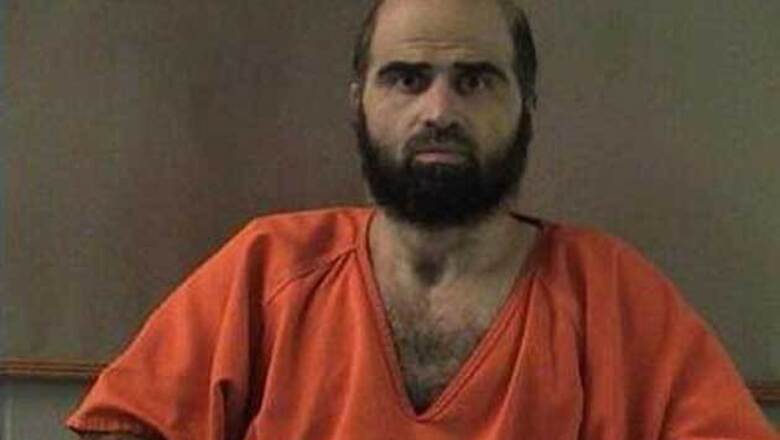
views
A military jury on Wednesday sentenced a US Army psychiatrist to death for the 2009 mass murder of 13 people, mostly unarmed soldiers, at Fort Hood, Texas, which the convicted gunman said he committed in retaliation for US wars in the Muslim world.
Major Nidal Hasan, who shouted "Allahu Akbar" ("God is greatest" in Arabic) during the attack and later said he wanted to be a martyr, faces death by lethal injection for the rampage that also wounded 31 people.
The jury deliberated just over two hours before deciding on the death penalty for Hasan, who opened fire with a laser-sighted handgun in a medical facility at the sprawling central Texas military base just weeks before he was to be deployed to Afghanistan.
Bearded and in a wheelchair, Hasan showed no visible expression as the president of the jury read aloud the sentence that he "be put to death." He is paralyzed from being shot by police trying to end the November 5, 2009 rampage.
Death sentences are rare in the military, which last executed a member of the service 52 years ago. Hasan, 42, will become the sixth man on death row at the US military's prison at Fort Leavenworth, Kansas. The same jury convicted him on Friday of 45 counts of premeditated murder and attempted premeditated murder.
Two widows and three mothers of the 13 murder victims were inside the courtroom and were quiet as the sentence was read. Afterward, two of the women embraced, and one woman could be seen crying.
An American-born Muslim, Hasan said in his opening statement on August 6 that he was the gunman and had switched sides in what he considered to be a US war on Islam.
He told mental health evaluators he wanted to become a martyr. Lawyers assisting him have said he was actively seeking the death penalty, although he disputed that claim.
In asking the jury to return a sentence of death prior to deliberations, Prosecutor Colonel Michael Mulligan told the jurors: "Don't be fooled."
"He is not now and never will be a martyr. He is a criminal. He is a cold-blooded murderer," Mulligan said. "He is not giving his life. We are taking his life."
The 13 murder victims were soldiers, officers, non-commissioned officers, enlisted and retired, he said.
Hasan, who acted as his own attorney, turned down his final chance to address the jury before deliberations.
Beyond his stunning admission in opening arguments, he has spoken little during his trial, turning down repeated opportunities to make a statement or present evidence.
Standby defense attorneys for Hasan attempted unsuccessfully to present so-called mitigating evidence to argue for a life sentence, including details on his background, family life, education, military experience and logs of his behavior in jail.
Hasan objected, complaining that he had "overzealous defense counsel."
Twenty family members and victims gave evidence during the prosecution's side of the sentencing phase, recounting heart wrenching stories about their loss, grief and struggles to rebuild their lives.
One young widow talked about her two suicide attempts, and a staff sergeant described his partial paralysis, his brain damage and his debilitating anger and depression since he was shot by Hasdan.
"What are 13 lives worth? What is a military career worth? What is the use of an arm worth? What is the loss of an eye worth?" the prosecutor asked the jury before deliberations. "What is the life of a child growing up without a father or mother worth?"
The jury also sentenced Hasan to be dismissed from the military and to be stripped of all pay.
The death sentence means the start of an automatic and lengthy appeals process, typically a minimum of four years, according to military officials. A military execution requires the approval of the Fort Hood commanding general and the US president in order to take place.
The US Disciplinary Barracks at Fort Leavenworth does not have a death chamber. Under the current agreement with the Bureau of Prisons, the Federal Correctional Complex in Terre Haute, Indiana, would carry out an execution, a USDB spokeswoman said.



















Comments
0 comment